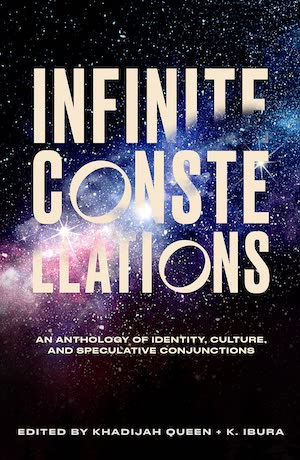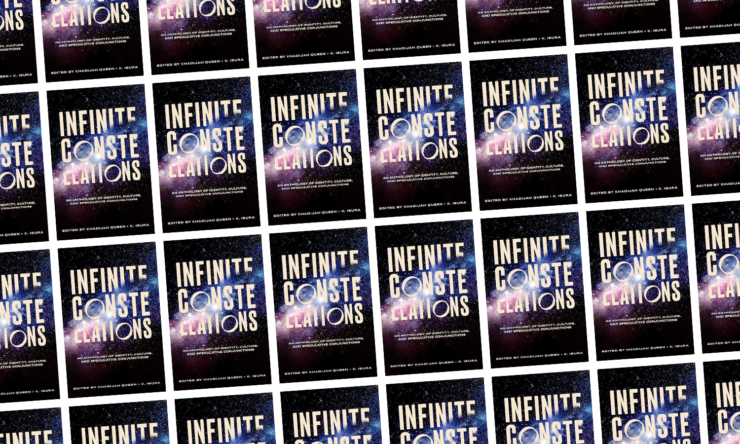Looking for a new short speculative fiction collection? Khadijah Queen and K. Ibura, two literary powerhouses, have you covered. Infinite Constellations: An Anthology of Identity, Culture, and Speculative Conjunctions brings together a variety of short stories and poetry, new stories and reprints, and longer pieces and excerpts, all from veteran and up-and-coming authors.
The introduction section of an anthology not only tells the reader what kinds of stories they’re about to read but also what the style and tone of the collection as a whole will be like. Obvious, right? So imagine my excitement when I saw Queen and Ibura’s introduction. Instead of an essay-like structure or a letter to the reader, their discussion of how the stories expound on the premise is interjected with quotes from many of the pieces in said collection. Their introduction is a fascinating piece of creative nonfiction in and of itself. “The writers in this anthology mirror, instruct, bind and unbind, myth-make and myth-invert, transform and transmute, make us belly laugh or hum our understanding or gasp or whisper gently or remember that sometimes we need to holler and fight as we grieve… This work does not presume, it presents—its presence a constellation of appearances, a symphony of belonging.”
Buy the Book


Infinite Constellations
All of the entries are good, but several really connected with me. I’ve been a fan of Sheree Renée Thomas and Daniel José Older for ages now, so of course I loved “From Senegal to Senatobia,” and “The Passing”. The former is about a Senegalese man who arrives in Mississippi to deal with his late uncle’s estate, while the latter involves a woman investigating a terrible death (it’s part of the Bone Street Rumba series). The poems “My Mother Told Me I Am Under Shango” by Tonya Liburd and “Canon” by Sarah Sophia Yanni were gorgeous and visceral. Lynn C. Pitts’ “The Swan” is probably my favorite. After a wild night with a mysterious stranger, feathers begin sprouting from a woman’s body. To stop herself from being cursed to turn into a swan, she summons Yemoja and makes a deal. Pitts blends classic fairytale tropes with a propulsive, funny, contemporary tone that had me hooked.
Because it’s coming from the University of Alabama Press, Infinite Constellations has a fairly academic feel to it. In terms of presentation, this was somewhat afield of my usual wheelhouse, but I’m glad I went for it. That’s my favorite part about speculative fiction, really. I enjoy stretching myself to try something that has elements I love but in configurations I don’t have much practice with. Sometimes it fails spectacularly, and other times, like now, it’s a win.
However, the flow between entries didn’t work well for me. Part of that was that there were so many pieces included (43 from 30 authors) that it felt overwhelming at times. Several of the entries were only a paragraph or so, which made it hard for me to get a feel for the work. We probably didn’t need multiple entries from the same authors, either; those were missed opportunities for other voices to be heard.
For a collection specifically about identity, there was one instance that rubbed me the wrong way. In Cindy Juyong Ok’s “Red Green Blue”, a character is given the nickname “White Chris”. Except that the character’s parents are white and Palestinian. His identity is brushed over as if it were incidental. There is no exploration of how he feels about being white and Palestinian, how that nickname sits with him, and what it says about the other characters, whose heritages are Korean, Indian, Brazilian, and someone whose identity isn’t specified but that speaks Arabic. Given that the collection is about identity and culture, that moment felt dismissive to me. And maybe that was the point, that the narrator was supposed to be callous in that moment. The rest of the story is compelling, but I couldn’t shake that nickname.
Readers who are teaching speculative fiction or lessons on identity and culture should definitely pick up a copy of Infinite Constellations: An Anthology of Identity, Culture, and Speculative Conjunctions. There are a lot of really interesting premises here that would build out your curriculum nicely. The stories herein will challenge, inspire, complicate, and elucidate.
Infinite Constellations is published by the University of Alabama Press.
Alex Brown is a Hugo-nominated and Ignyte award-winning critic who writes about speculative fiction, librarianship, and Black history. Find them on twitter (@QueenOfRats), instagram (@bookjockeyalex), and their blog (bookjockeyalex.com).










